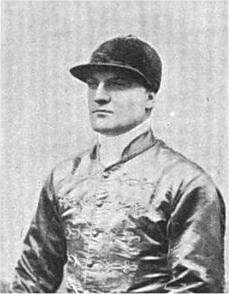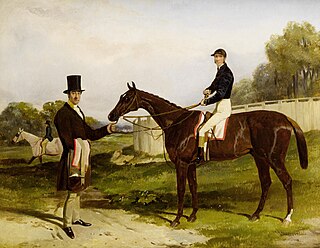
Horse racing is the second largest spectator sport in Great Britain, and one of the longest established, with a history dating back many centuries. According to a report by the British Horseracing Authority it generates £3.39 billion total direct and indirect expenditure in the British economy, of which £1.05 billion is from core racing industry expenditure, and the major horse racing events such as Royal Ascot and Cheltenham Festival are important dates in the British and international sporting and society calendar.
Martin Charles Pipe, is an English former racehorse trainer credited with professionalising the British racehorse training industry, and as of 2021 the most successful trainer in British jump racing.
The champion jockey of flat racing in Great Britain is the rider who has the most wins during a season. For most of its existence, the jockeys championship was decided on the number of winners ridden between Lincoln Handicap Day and November Handicap Day, the traditional flat turf season. In 2015, it was announced that the title would be decided over a reduced timescale – the start of the Guineas Meeting and British Champions Day, roughly 24 instead of 32 weeks.
The Champion Trainer of flat racing in Great Britain is the trainer whose horses have won the most prize money during a season. The list below shows the Champion Trainer for each year since 1896. The Championship was originally run from November until the end of the following October but since 2016 it has spanned from January until December.
Peter Michael Scudamore MBE, often known as 'Scu', is a trainer and former jockey in National Hunt racing. He was an eight-time Champion Jockey, riding 1,678 winning horses in his career. He was appointed a Member of the Order of the British Empire (MBE) for services to National Hunt Racing in the 1990 Birthday Honours.
Richard Michael Hannon, known as Richard Hannon Sr. to distinguish him from his son, is a former British horse trainer. He was British flat racing Champion Trainer four times, achieved more than a century of victories in a season 20 times, a double century five times, and turned out 32 Royal Ascot winners. He operated out of Herridge Racing Stables, near Marlborough, Wiltshire, with a smaller yard at Everleigh on the edge of Salisbury Plain. He retired after winning a final trainers' championship at the end of 2013, when the training operation was taken over by his son, Richard Hannon Jr.
Geoff Wragg was a Thoroughbred horse trainer who trained champion horses such as Teenoso and Pentire. He was the son of former jockey and trainer Harry Wragg, from whom he took over the licence at Abington Place, Newmarket in 1983 upon his father's retirement. Wragg retired in 2008 after 25 years of training and sold Abington Place to Sheikh Mohammed bin Khalifa Al Maktoum the following spring. He relocated to Yorkshire, the birthplace of his late father, Harry Wragg. He died in 2017.
Gerald Barnard Balding Jr. OBE, known as Toby Balding, was a British racehorse trainer, one of the few to have won the "big three" British jump races—the Grand National, Cheltenham Gold Cup and Champion Hurdle.

Herbert Mornington Cannon (1873–1962), commonly referred to as Morny Cannon, was a six-time Champion jockey in the United Kingdom in the 1890s. He holds the records for the most wins by a jockey in the Craven Stakes, Coronation Stakes and Prince of Wales's Stakes. His most famous mount was Flying Fox who won the British Triple Crown in 1899. He was the son of English jockey and trainer Tom Cannon (1846–1917). In his day he was considered the most perfect master of style and he epitomised "the art of jockeyship".
Ernest Piggott (1878–1967) was a leading British jump racing jockey, whose family has become one of the leading dynasties in British horseracing. He was three times Champion Jockey and three times Grand National winner. His son, (Ernest) Keith Piggott (1904–1993), was also a leading jump jockey and National-winning trainer, while his grandson was the 11-times British flat racing Champion Jockey, Lester Piggott.
Priscilla Victoria Hastings was a British racehorse owner and trainer. She was one of the first three women to be elected as a member of the Jockey Club in December 1977, alongside her half-sister Ruth Wood, Countess of Halifax and Helen Johnson Houghton.

John Barham Day (1793–1860) was a British jockey and trainer. For much of his career he was usually known simply as John Day; when his son of the same name rose to prominence, the older man was referred to as John Barham Day, John Day, Sr. or Old John Day. A member of a highly successful racing family, Day first made his name as a jockey in the 1820s and rode the winners of sixteen classics before retiring. In the mid-1830s he set up as a trainer of racehorses at Danebury near Stockbridge. He established a reputation as a shrewd and skillful handler of horses and specialised in landing betting coups. Horses trained by Day won seven classics between 1838 and 1854, during which time he was regarded as the leading trainer in the South of England and the main rival of the Yorkshire-based John Scott. He was known as "Honest John", but the sobriquet appears to have been applied ironically.

John Day was a British jockey and trainer. A member of a large and highly successful racing family Day was sometimes known as Young John Day or John Day, Jr. to distinguish him from his father John Barham Day. The younger John Day had some success as a jockey before taking over from his father as the trainer at the Danebury stables in 1847. In a training career of over thirty years Day sent out the winners of twelve classics including three winners of The Derby. Like many trainers of his time, Day was a heavy gambler and clashed on several occasions with other leading turf figures.

Tom Cannon Sr. was a British flat racing jockey and trainer. He won 13 British classics as a jockey, becoming champion in 1872. As a trainer, he trained classic winners, as well as winners over jumps, including the 1888 Grand National. He was the father of four jockey sons, including the six-times champion, Morny Cannon, and the great-grandfather of eleven-times champion, Lester Piggott.
Richard Michael Hannon Jr. is a British racehorse trainer. He is the son of, and former assistant to, four time British flat racing Champion Trainer Richard Hannon Sr. He operates from the 160 capacity Herridge Racing Stables, near Marlborough, Wiltshire, with a smaller yard at Everleigh on the edge of Salisbury Plain. He took over the training operation from his father at the end of 2013.
Ernest Johnson is an Epsom Derby winning British flat racing jockey.

Frank Butler was an English jockey who became one of the country's top riders. In a period of about 11 years he won The Derby twice, The Oaks on six occasions, the Two Thousand Guineas twice, the One Thousand Guineas twice, the St Leger, the Goodwood Cup on three occasions and the Triple Crown on West Australian. In his final years of racing he won 143 races from 384 starts. Illness forced him to stop riding in 1854 and he died two years later at the age of 39.
Richard Goodisson was an English classic-winning jockey and trainer, who won the first three runnings of the Oaks Stakes between 1779 and 1781.